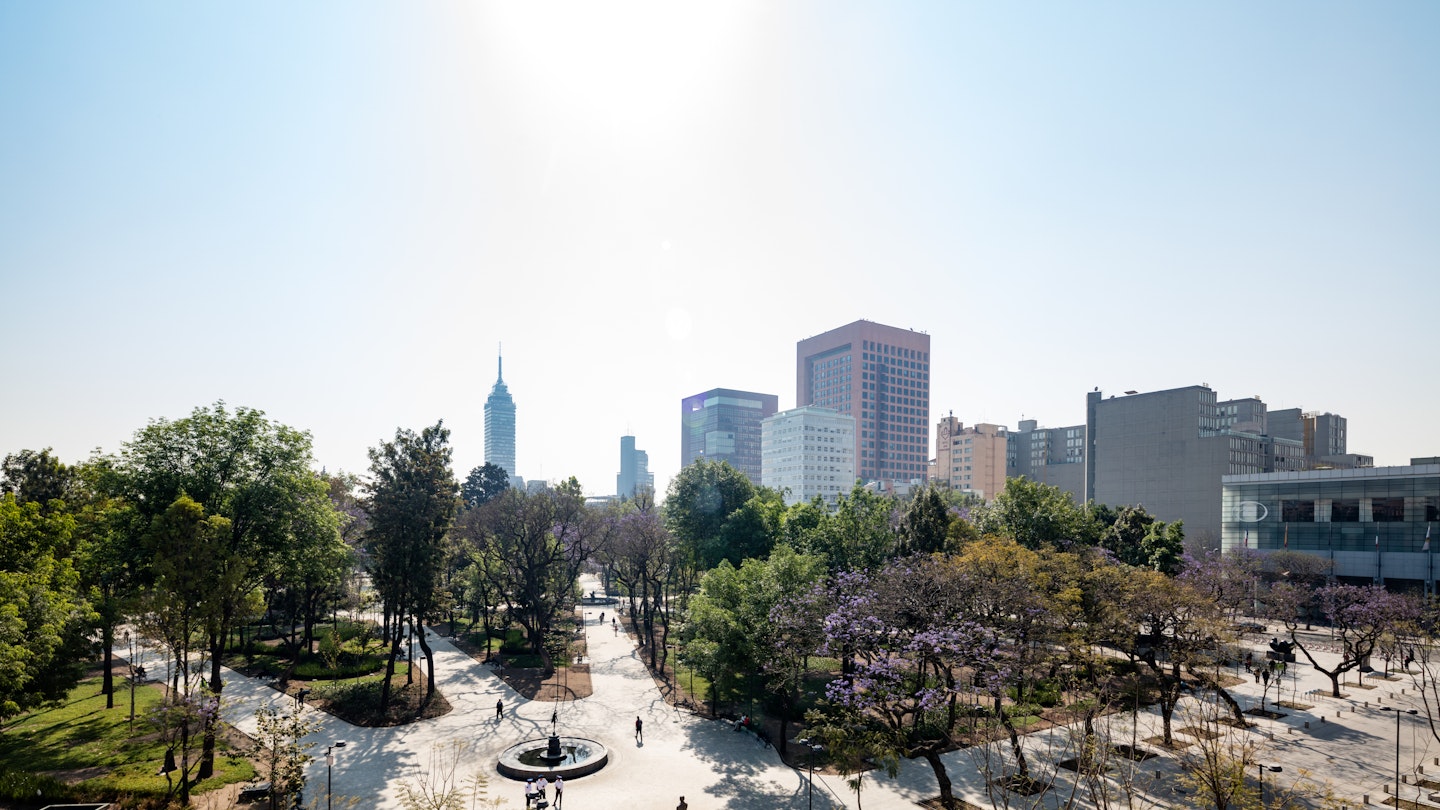As one of the world’s largest urban sprawls, Mexico City may not conjure up images of a “green city” but it actually has a surprising offering of verdant getaways awaiting in its leafy urban parks, hiker-friendly forests, and fertile ancient gardens. Sure, the colossal capital can feel downright hectic at times but no matter where you go, you’re never far from the quiet calm of a park.
Chapultepec Park (Bosque de Chapultepec)
For more than seven centuries, Chapultepec (Náhuatl for “Hill of Grasshoppers”) has served as a refuge for Aztec nobles, a residence for foreign emperors and Mexican presidents, and, of course, as a popular getaway from the grind of modern-day Mexico City. Approached from the east entrance, the stately Chapultepec Castle rises above the park as a visual reminder of Mexico’s bygone aristocracy.
With nine museums, a pair of cultural centers, and several large lakes spread out over 1700 acres of wooded grounds, it could easily take days to visit all the sights. A must-see is the world-class Museo Nacional de Antropología, a vast anthropology museum that exhibits more than most people can absorb in a single visit.
Chapultepec is also home to important works of art by Frida Kahlo and Diego Rivera at the Museum of Modern Art and the Fuente de Tlaloc. Moreover, if you have kids in tow, be sure to visit the Papalote Museo del Niño to experience a child’s wonderland of hands-on exhibits.
Parque Nacional Cumbres del Ajusco
For sweeping views of the Valley of Mexico, head south to the cool forestlands of Ajusco, where you can climb Mexico City’s highest peak. The summit of Pico del Águila (12,916ft) may seem somewhat strenuous; however, if you can make it to the top, the panoramic vista makes it all worthwhile, especially on a clear day.
For the less adventurous, Ajusco’s windy mountain road is dotted with open-air roadside eateries preparing delectable treats such as wild mushroom soup and quesadillas stuffed with cheese and squash blossom. We love the home cooking and open-air dining at Guarida del Conejo.
Looking for an overnight escape from the city? The Ajusco cooperative Parque Ejidal San Nicolás Totolapan provides everything you’ll need with its affordable log cabins, camping sites, mountain bike rentals, and multiple trails to explore the surrounding piney forest on bike or foot.
Parque Ecológico de Xochimilco
Declared a UNESCO World Heritage Site, the canals of Xochimilco are the last vestiges of a vast system of waterways that once crisscrossed the Valley of Mexico. Every day, colorful gondolas (trajineras) glide through the canals, offering visitors a glimpse of the city’s pre-Hispanic legacy as the boats float past chinampas, manmade garden plots invented by the Aztecs.
The tranquil Parque Ecológico de Xochimilco and the nearby waters of Cuemanco provide some of the best bird-watching opportunities along the canals. At this revamped ecological park, visitors can rent paddle boats and bikes, visit an onsite museum, or simply relax among colorful flower gardens.
You can hire a gondola inside the park (Covid restrictions permitting); alternatively, if you prefer something more festive, make your way over to the nearby Cuemanco docks where passengers are serenaded by mariachis over cold cervezas.
Parque Nacional Desierto de los Leones
Most locals visit this national park for a picnic and an afternoon stroll around its beautifully restored 17th-century Carmelite convent with manicured gardens. However, there’s plenty more to explore along extensive hiking and biking trails that lead to babbling brooks, waterfalls, and scenic ravines.
The fragrant pine and oak forest remains cool throughout the year, making it ideal for long hikes – a climb up Cerro San Miguel, the park’s highest mountain at 12,400ft above sea level, provides expansive views of the surrounding mountains.
After a day out on the trails, grab a bite near the monastery, where restaurants serve fresh trout and tasty corn-based snacks. In case you’re curious about the park’s unusual name, the Carmelites referred to their remote monasteries as “deserts,” while “leones” likely refers to the last name of a former convent official.
Alameda Central
We would be remiss if we didn’t include a park that’s nearly as old as the city itself! Built in 1592, Alameda Central is the oldest park in the Americas and remains one of the city’s most important landmarks.
Fitted with dancing fountains and paved paths flanked by lavender plants, the rectangular park is a popular weekend gathering spot, surrounded by some of downtown’s most iconic sights.
On Alameda’s east end stands the splendid white marble Palacio de Bellas Artes, a top-notch fine arts venue and home to masterful murals by Mexico’s most accomplished artists. On the park’s west side, visitors can enjoy a museum featuring one of Diego Rivera’s most famous murals, aptly named Dream of a Sunday Afternoon in Alameda.
Around Alameda, you’ll discover over a half-dozen museums, several colonial-era churches, spirited street-chess matches, and some of the best people-watching in the city.
Parque México
Wondering where to go for a morning jog or a strong cup o’ joe? Head to the Condesa neighborhood’s tree-shaded Parque México, a former horse-racing track converted into a large oval-shaped park in the 1920s.
Designed with European influences and abundant tropical vegetation, this park is considered one of the city’s loveliest and most convivial, featuring attractive garden walkways, soothing fountains, and surrounding sidewalk restaurants.
If you’re into architecture, take a stroll around the edge of the park and appreciate the art deco gems along Avenida México and Avenida Amsterdam. Alternatively, simply relax at a coffee shop and soak up the laid-back vibe of one of the city’s trendiest communities. Parque España, two blocks northwest, is another popular Condesa park situated in the heart of hipster central.





